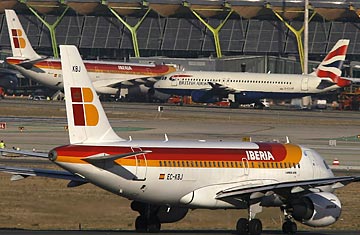
British Airways and Iberia passenger jets taxi to positions at the Barajas airport in Madrid, November 12, 2009. Spanish airline Iberia's board has approved a merger with British Airways, El Pais reported on its website on Thursday. Iberia chairman Antonio Vazquez will be chairman of the new company, whose headquarters will be in London, the newspaper said.
So after 18 months of circling, it finally landed: British Airways announced its highly anticipated merger with Iberia late Thursday, coupling BA's access to the U.S. with the Spanish carrier's routes to Latin America in one of the biggest deals in aviation history.
The aim of the merger, slated for completion late next year, is simple. BA and Iberia — combined annual revenues: $22 billion — are chasing their rivals' tails. Germany's Lufthansa, Europe's second-largest airline, has picked up smaller carriers from Austria to Switzerland in recent months. Thanks to the 2004 merger of the French and Dutch airlines, Air France-KLM is even further out in front. Troubled Iberia and BA, which both announced ugly losses over the past week, reckon eliminating duplicate services from fleet maintenance to business class lounges will save the airlines $600 million a year. That'll mean "a strong European airline will able to compete in the 21st century," BA boss Willie Walsh, who'll head the new company, said in a statement.
The history of airline mergers, though, might suggest otherwise. Success stories — Air France and KLM in Europe; Delta and Northwest in the U.S. — are rare. Of the dozens of deals struck in the U.S. since the airline industry was deregulated in the late 1970s, most are considered flops. "I compare it to two drunks, where you assume that if they hold on to each other, they will walk straight," says Adam Pilarski, senior vice-president of U.S. aviation consultancy Avitas. He points to the bungled 2005 merger of US Airways and America West, and adds, "That's usually not the case."
With runaway costs and labor disputes scuttling plenty of these deals in the past, BA and Iberia — set to keep their separate brands and operating divisions under a new Spain-based holding company — will need to proceed with caution. Sure, rough economic head winds and the business of turning two firms into one can give cost cutting real momentum. The tough trading conditions following the Sept. 11 terrorist attacks were, after all, a "catalyst for the success of [the Air France-KLM merger] at the time," says Howard Wheeldon, an aviation expert at brokers BGC Partners in London.
But imposing those cuts, including slashing jobs, could be tricky. The staff at both airlines are heavily unionized. Hundreds of Iberia flights have been grounded in recent days due to a cabin crew strike over pay; a separate dispute among flight attendants at BA could see more planes parked in the run-up to Christmas.
History offers a warning to the unwieldy, too. Even if they trim their operating budgets, BA/Iberia will still be carrying serious weight — the combined firm should fly some 60 million passengers each year. But that calls for slick organization, something BA hasn't always enjoyed. (Remember the opening of Heathrow Airport's Terminal 5?) "When United [Airlines] went into Chapter 11, they were the largest airline in the world," says Pilarski. "Airlines that went under didn't go under because they were so puny they just needed to be bigger. If BA at their size is not efficient, something is major league wrong."
In other words, "If you put one high-fare, loss-making airline together with another high-fare, loss-making airline," Michael O'Leary, head of low-cost rival Ryanair, told Bloomberg, "you will get an airline with higher fares making much bigger losses."
